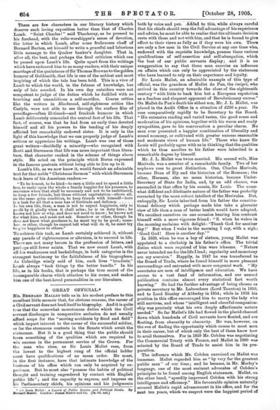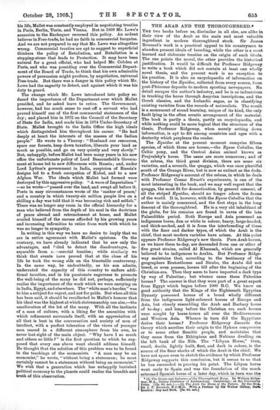Ma. BERNARD 11/.7T PT tells us in his modest preface
to this excellent little memoir that, for obvious reasons, the career of a Civil servant does not lend itself to biography. And it is quite true that the somewhat monotonous duties which the Civil servant discharges in comparative seclusion do not usually afford scope for the "moving accidents by flood and field" which impart interest to the career of the successful soldier, or for the strenuous contests in the Senate which await the statesman. But it is a good thing that the public should learn something of the qualities which are required to win success in the permanent service of the Crown. For the man who rises, as Sir Louis Mallet rose, from the lowest to the highest rung of the official ladder must have qualifications of no mean order. He must, in the first instance, have that intimate knowledge of the business of his office which can only be acquired by ex- perience. But he must also "possess the habits of political thought and training engendered by contact with English public life " ; and the capacity to express, and impress on his Parliamentary chiefs, his opinions and his judgments • air Louis Mallet: a Eecord of Public Service and Political Ideals. By Bernard Mallet. London : James Nisbet and Co. [7s. 6d. net.)
both by voice and pen. Added to this, while always careful that his chiefs should reap the full advantage of his experience and advice, he must be able to realise that the ultimate decision rests with them and not with him, and that he is bound to give effect to their views as fully as if they were his own. There are only a few men in the Civil Service at any one time who, endowed with the requisite knowledge, possess these various qualifications of self-assertion and self-abnegation, which the best of our public servants display ; and it is no exaggeration to say that these men exercise an influence on affairs which can only be appreciated by the statesmen who have learned to rely on their experience and loyalty.
Sir Louis Mallet, an admirable example of this type of official, was the grandson of Mallet du Pan, the emigre, who arrived in this country towards the close of the eighteenth century " with little to back him but a European reputation as a fearless and eloquent opponent of Revolutionary excess."
On Mallet du Pan's death his eldest son, Mr. J. L. Mallet, was placed in the Audit Office in a situation of £250 a year. He rose comparatively rapidly to be Secretary to the Board.
" His extensive reading and varied tastes, the good sense and moderation of his opinions, together with his warm and ready sympathies, gave to his conversation a peculiar charm. No man ever presented a happier combination of liberality and sound economy, or cultivated with greater success reasonable and moderate views of human life." Those who knew Sir
Louis will probably agree with us in thinking that the qualities which be thus ascribes to his father were inherited in a remarkable degree by himself.
Mr. J. L. Mallet was twice married. His second wife, Miss Merivale, was a member of a remarkable family. Two of her nephews rose to great distinction. One, Charles Merivale,
became Dean of Ely and the historian of the Romans ; the other, Herman, also no mean historian, became Under- Secretary of State for India, and, by an odd chance, was succeeded in that office by his cousin, Sir Louis. The some- what diffident and dilettante nature of the father was probably corrected by the more robust intellect of the Merivales. But, unhappily, Sir Louis inherited from his father the constitu- tional delicacy which perhaps made him take a gloomier view of life than a man of better health would have adopted. We recollect ourselves on one occasion hearing him contrast himself with a more vigorous friend : " S. when he wakes in the morning exclaims with delight : ' Thank God for another day!' But when I wake in the morning I say, with a sigh: ' Good God ! Here is another day.' " In 1839, when he was a boy of sixteen, young Mallet was appointed to a clerkship in his father's office. The trivial duties which were required of him were irksome. " Nature
never intended me for the life I lead; regularity and monotony are my aversion." Happily, in 1847 he was transferred to the Board of Trade, where he found himself in more pleasant surroundings and entrusted with more congenial work. " My associates are men of intelligence and education. We have access to a vast fund of information, and our annual publication contains almost every statistical fact worth knowing." He had the further advantage of being chosen as private secretary to Mr. Labouchere (Lord Taunton) in 1850, and to Lord Stanley of Alderley in 1854; while in 1858 his position in this office encouraged him to marry the lady who still survives, and whose "intelligent and cheerful companion- ship was precisely what his own deeply affectionate nature needed." So far Mallet's life had flowed in the placid channel down which hundreds of Civil servants have floated, and are floating, from obscurity to obscurity. He was, however, on the eve of finding the opportunity which comes to most men in their career, but of which only the best of them know how to avail themselves. For in 1859 Mr. Cobden was negotiating the Commercial Treaty with France, and Mallet in 1860 was selected by the Board of Trade to assist him in its pre- paration.
The influence which Mr. Cobden exercised on Mallet was immense. Mallet regarded him as " by very far the greatest public man" of our time ; and he became, in Mr. Morley's language, one of the most eminent advocates of Cobden's principles to be found among English statesmen. Mallet, on the other hand, " speedily impressed Cobden with his strong intelligence and efficiency." His favourable opinion naturally secured Mallet's rapid advancement in his office, and for the next ten years, which we suspect were the happiest period of his life, Mallet was constantly employed in negotiating treaties in Paris, Berlin, Turin, and Vienna. But in 1869 Mr. Lowe's accession to the Exchequer reversed this policy. An ardent believer in Free-trade, he had no faith in commercial bargains.
And we are not prepared to say that Mr. Lowe was altogether wrong. Commercial treaties are apt to suggest to superficial thinkers the policy of Retaliation, and Retaliation is a stepping-stone that leads to Protection. It may have been natural for a great official, who had helped Mr. Cobden at Paris, and who was presiding over the Commercial Depart- ment of the Board of Trade, to think that his own admirable powers of persuasion might produce, by negotiation, universal Free-trade. But there was a danger in this policy which Mr. Lowe had the sagacity to detect, and against which it was his duty to guard.
The change which Mr. Lowe introduced into policy re- duced the importance of the Department over which Mallet presided, and he asked leave to retire. The Government, however, had too much sense to cast off a servant who had proved himself one of the first commercial statesmen of the day ; and placed him in 1872 on the Council of the Secretary of State for India, and made him in 1874 Under-Secretary of State. Mallet brought to the India Office the high ideals which distinguished him throughout his career. "He had deeply at heart the interests of the masses of the Indian people." He wrote to a Viceroy : "Husband our resources, spare our forests, keep down taxation, liberate your land as much as possible, and go on very quietly and very slowly." But, unhappily, before Mallet had been many years in his new office the unfortunate policy of Lord Beaconsfield's Govern- ment at home led to new differences with Russia ; and, under Lord Lytton's government in India, suspicion of Russia's designs led to a fresh occupation of Kabul, and to a new Afghan War. The ideals which Mallet had formed were destroyed by this aggressive policy. " A wave of Imperialism " —so he wrote—" passed over the land, and swept all before it. Poets in easy circumstances wrote of the ' canker of peace,' and a country in which twenty-six million people live on a shilling a day was told that it was becoming rich and selfish." There was no longer any room in the official hierarchy for a man who believed from the depth of his soul in the doctrines of peace abroad and retrenchment at home, and Mallet availed himself of the excuse afforded by his growing years and increasing infirmities to retire from work with which he was no longer in sympathy.
In writing in this way we have no desire to imply that we are in entire agreement with Mallet's opinions. On the contrary, we have already indicated that he saw only the advantages, and fliled to detect the disadvantages, in- separable from c, qmercial treaties ; while similarly we think that events have proved that at the close of his life he took the wrong side on the bimetallic controversy. In the same way, he undoubtedly, as his son admits, underrated the capacity of this country to endure addi- tional taation, and in his passionate eagerness to promote the well-being of the many he did not, perhaps, sufficiently realise the importance of the work which we were carrying on in India, Egypt, and elsewhere. The "white man's burden" was to him a subject for regret, and not for pride. But when all this has been said, it should be recollected to Mallet's honour that his ideal was the highest at which statesmanship can aim,—the amelioration of the lot of the many. With all the instincts of a man of culture, with a liking for the amenities with which refinement surrounds itself, with an appreciation of all that is best in the conversation and society of men of intellect, with a perfect toleration of the views of younger men reared in a different atmosphere from his own, he never lost sight of the main object. " Why have I so much and others so little ?" is the first question to which be sup- posed that every one above want should address himself. He thought that the solution of this problem was to be found in the teachings of the economists. "A man may be an economist," ho wrote, "without being a statesman; he most certainly cannot be a statesman without being an economist." We wish that a generation which has unhappily banished political economy to the planets could realise the breadth and truth of this observation.



















































 Previous page
Previous page